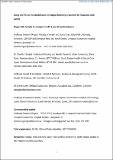Using the PCI in the identification of fatigue following treatment for head and neck cancer
Abstract
Fatigue has a profound impact on health-related quality of life (HRQOL) and the aim of this study is to describe the clinical characteristics and HRQOL for head and neck cancer patients who raise the issue of fatigue on the Patient Concerns Inventory (PCI), at their review consultation. Eight consultants were randomised to use the PCIas part of a cluster-controlled trial. Patients also completed the UW-QoLv4 (University of Washington Quality of Life), EQ-5D-5L (EuroQolGroup) and Distress Thermometer. There were 140 patients who attended clinics at a median (IQR) of 108 (70-165) days after the end of treatment. The PCI item ‘fatigue’ was the 6th most commonly selected, by 29% (40). Those with advanced tumours were more likely (36% 30/83 Vs 18% 10/56, p=0.02) to have selected the item, as were those treated with radiotherapy +/-chemotherapy (39% 34/87 Vs 11% 6/53, p<0.001). The PCI fatigue group reported significantly worse overall QOL, social-emotional and physical function composite scores, distress thermometer, and EQ-5D. PCI-fatigue was common in those with sleeping, nausea, mood, depression, mobility, breathing and energy level concerns. In conclusion, given the problems associated with fatigue, it is appropriate to screen and seek interventions that might help patient address this.
Citation
Rogers , S N , Semple , C J , Humphris , G M , Lowe , D & Kanatas , A 2020 , ' Using the PCI in the identification of fatigue following treatment for head and neck cancer ' , International Journal of Oral and Maxillofacial Surgery , vol. In Press . https://doi.org/10.1016/j.ijom.2020.11.001
Publication
International Journal of Oral and Maxillofacial Surgery
Status
Peer reviewed
ISSN
0901-5027Type
Journal article
Description
Funding: National Institute for Health Research (NIHR) under its Research for Patient Benefit (RfPB) Programme (Grant Reference Number PB-PG-0215-36047).Collections
Items in the St Andrews Research Repository are protected by copyright, with all rights reserved, unless otherwise indicated.

